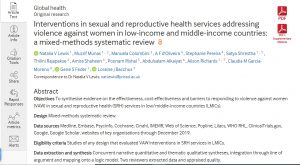Addressing violence against women through sexual and reproductive health services in low and middle-income countries
24 February 2022
Integrating programmes on violence against women into sexual and reproductive health services and surrounding communities in low- and middle-income countries may reduce re-occurrence of violence and improve women’s health. However, the evidence is limited and conflicting, according to a new systematic review published in BMJ Open. To be more effective programmes need to be better tailored to women’s needs and target individual women and healthcare providers, sexual and reproductive health services, and local communities.
One in three women worldwide has experienced physical or sexual violence, mostly by an intimate partner. Violence against women is more common in low- and middle-income countries. This violence has detrimental effect on women’s sexual and reproductive health including sexually transmitted infections, unplanned pregnancies, and gynaecological conditions. Many programmes addressing violence against women have been integrated into sexual and reproductive health services which most women attend at some point. The research team aimed to systematically review evidence on the effectiveness of these programmes in low- and middle-income countries..
The research team found 26 studies and clustered them into three categories based on the target group(s) and location of the common activities. It was not possible to conclude which programme was the most effective in reducing re-occurrence of violence and improving women’s health because the studies evaluated different programmes, measured different outcomes, and had methodological weaknesses.
The review of 26 studies was undertaken by an international team, including researchers at the Centre for Academic Primary Care (CAPC) at the University of Bristol and the National Institute for Health and Care Research Applied Research Collaboration West (NIHR ARC West). It also included researchers from University of Bristol, London School of Hygiene and Tropical Medicine, University of São Paulo (Brazil), Kathmandu University (Nepal), An-najah National University (State of Palestine), University of Peradeniya (Sri Lanka).
Of the studies, ten programmes strengthened health system capacity to respond to violence against women during routine sexual and reproductive health consultations. Three of these studies reported no harm to women and reduction in some types of violence. Nine programmes strengthened health systems and communities’ capacity to respond to violence against women. Of those three reported conflicting effects on re-occurrence of violence and mixed effects on women’s sexual and reproductive health.
These programmes increased identification of violence but had no effect on the provision and uptake of referrals to specialist services. Seven psychosocial programmes in addition to a routine sexual and reproductive health consultation helped women better cope with the consequences of violence . Four of these programmes reduced re-occurrence of violence and improved women’s health. No studies evaluated programmes’ cost-effectiveness.
The researchers also identified factors that could disrupt programme effects:
- accepting attitudes towards violence against women among healthcare providers, women, communities, society
- fear of negative consequences
- society, health systems and individual women and healthcare providers not being ready to respond to violence against women
Dr Natalia Lewis, a Research Fellow at the University of Bristol’s Centre for Academic Primary Care and first author on the study, said:
“Our review found limited conflicting evidence for the effectiveness of integrated programmes on sexual and reproductive health and violence against women in low- and middle-income countries.”
“We need more methodologically robust evaluations of programmes that strengthen the capacity of the health services, communities, and individual women and healthcare providers to respond to violence.”
Paper
